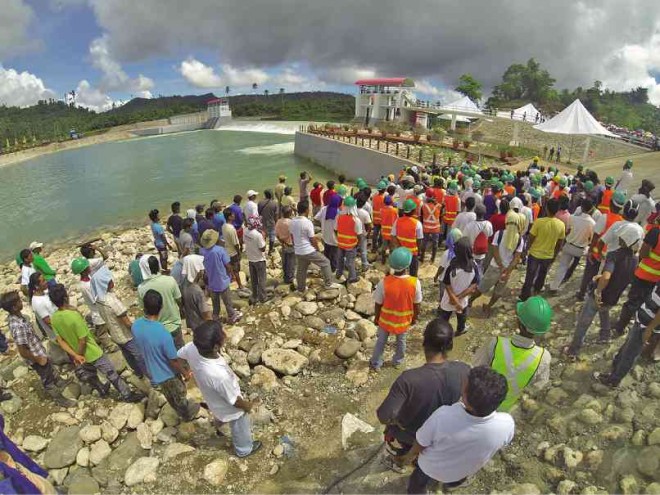P289-M irrigation dam rises in Davao Oriental

CONSTRUCTION workers watch the ceremony to inaugurate the P289-million irrigation dam project in the village Aragon in Cateel town, Davao Oriental province. photo: NICO ALCONABA/INQUIRER MINDANAO
CATEEL, Davao Oriental—As the province rises from the devastation wrought by Typhoon “Pablo” two years ago, local officials on Tuesday inaugurated a P289-million irrigation dam, touted as one of Mindanao’s biggest, optimistic of a stable rice production and rice sufficiency.
Gov. Corazon Malanyaon said the infrastructure would also help provide alternative livelihood to coconut farmers after the 2012 storm destroyed close to 6 million coconut trees in the province.
“Our action today will decide whether tomorrow is filled with famine or food security, poverty or prosperity. The stakes are simply too high,” Malanyaon said during the ceremony in Barangay Aragon here.
The dam is expected to irrigate about 1,600 hectares of rice lands in this town, one of the hardest-hit when Pablo ravaged Southern Mindanao in December 2012, benefiting farmers in 11 villages.
Its construction started in November 2011, with funds coming from the World Bank’s Mindanao Rural Development Project (MRDP), but the project hit a snag when Pablo pushed back its completion.
Malanyaon said the WB-MRDP afforded the provincial government a financial breather, taking most of the financing as the Department of Agriculture shouldered 80 percent of the 50 percent equity the program required of the local government unit.
Funded out of MRDP’s P498-million budget, the infrastructure was the last of the big-ticket projects of the 15-year Mindanao development program, officials said.
Lealyn Ramos, program director, said the irrigation project was its biggest in terms of “physical and financial aspects.” She lauded local officials for their determination to finish it.
For farmer Amelito Bagumba, the dam was a long-sought dream of having a stable and sustainable source of irrigation water. He has spent at least P20,000 for fuel and labor every cropping season from the use of a diesel-fired water pump in his 1.5-ha rice field in Alegria village, 7 kilometers from Aragon.
“The hard part was that the water source was unreliable so you had to pay for (pump) installation costs several times per cropping,” Bagumba, 46, said.
Joseph Alonzo, president of Boguis Irrigators’ Association in Alegria, said the facility would irrigate about 100 ha in his community throughout the year. “We can now hope for an increased harvest every cropping,” he said, adding that palay yield could go as high as 200 sacks per hectare.
Describing the dam as Davao Oriental’s “road to rice self-sufficiency,” Malanyaon said she hoped the project would augment farm income as it would provide a stable supply of irrigation water yearlong.
“We can keep the poor fed if we can correctly set our priorities. We can grow enough food and generate employment for them while maintaining our natural resources base and preserving diversity,” she said.
She said the project would also help in the full recovery of Cateel, Caraga and Baganga, the three towns hardest-hit by Pablo. Cateel accounts for 54 percent of Davao Oriental’s 23,000 ha of rice lands and complements other rice-producing towns, such as Lupon and Banaybanay.
Agriculture Undersecretary Emerson Palad, chief for operations of the department, said the government would provide bridges, farm-to-market roads and other infrastructure projects to Davao Oriental to boost farmers’ income by reducing the cost of marketing their products. Frinston L. Lim, Inquirer Mindanao














